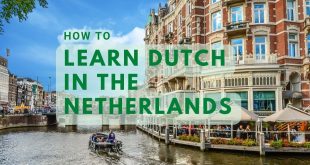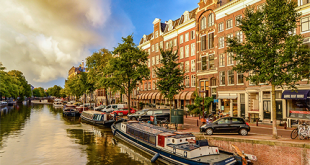Students usually undertake a master to extend their knowledge in their area of specialization, as a pathway to a PhD, and to add their contribution to their field of knowledge. It’s also a way to improve their professional profile and then increase their employability in their area of expertise. In other words, having a master’s degree is always worth it, and doing it in a country that provides a world-class education is even better! Here is our guide on masters degrees and programs in the Netherlands.
Read also about PhD in the Netherlands.
Table of Contents
Is the Netherlands good for masters?
The Netherlands has a long tradition of welcoming international students, in a cosmopolitan culture and with a top-notch education. That’s how the country is home to more than 85,000 international students, from more than 160 nationalities. All of this make of the Netherlands, not only one of the most popular study destinations in Europe, but also one of the best places to earn a master’s degree.
Whatever your area of specialization, masters studies in the Netherlands tend to have a more practical approach involving more project work and real-life case studies. Higher education in the Netherlands also emphasizes more in team work and encourages a lot of interaction between students and teachers.
Additionally, universities in the country tend to offer more and more subjects in the English language. More specifically, more than 2,000 programs, which is more than what is offered in any other European countries, except for the UK and Ireland. And the more popular the subject is, the more chance there is that it is taught in English.
The other reason why the Netherlands is good for masters is the guaranteed quality of the education provided in the country. As attested by the fact that 13 universities in Holland are also among the top 200 globally. The same goes for the degrees and qualifications that are awarded in accordance to the Bologna process.
Moreover, any courses at any institutions in the country are thoroughly checked by the Netherlands and Flemish Accreditation Organization (NVAO), every 6 years. This is to make sure they meet the academic context as well as the needs of the local economy and labor market.
Course structure and types of degrees
Master’s degrees in Holland are second-cycle qualifications, that you earn after a bachelor’s degree or any other undergraduate degree. This type of postgraduate program usually leads to a:
- MA (Master of Arts)
- M.Sc. (Master of Science)
- LLM (Master of Laws)
- MRes (Master of Research)
The number of ECTS credits and thus the duration of the program depends on the type of masters you study in the Netherlands. Moreover, the components of each program also depend on the type of institution. At research universities, the program always features research work, even for MA and M.Sc. While at universities of applied sciences, courses may include internships and work placement, for the students to get hand-on work practice.
Teaching, grading system and assessment
The higher education in the Netherlands has a system that focuses on teamwork and a lot of interactions between students and teachers. This increases for master’s programs, where students are encouraged to share and discuss their ideas with other students and tutors.
The assessment is made based on the credits you earn through the completion of academic modules, work placements and the final research project and thesis. Moreover, in the Netherlands, grading goes through a ten-point system, one being very poor and ten being the highest score.
How long is a Master’s degree in the Netherlands?
The length of a master’s program in the Netherlands depends on the type of qualification as well as the field of study. But in general, master’s programs last between one and two years and can go up to 4 years in some cases. Each year of study is worth 60 credits ECTS.
That’s how a master of laws lasts 1 year. A master of arts will take up to 2 years (120 ECTS) to complete. And a master of science is worth 180 ECTS, meaning it takes up to 3 years of study. All 3 qualifications are available at both research universities and universities of applied sciences.
Lastly, for 240 ECTS, which take 4 years to earn, students get a master called with the name of the study area. It can be for example, a master of architecture or M.Arch. The academic year in the Netherlands run from September to June. However, students usually undertake internships or work on their dissertation during the summer break.
Where can I study masters in Holland?
There is another factor that determines the difference between masters’ programs in the Netherlands: the type of institution you study in.
At research universities
Master’s programs are more academic but still has some professional courses involved. The primary goal of masters at research universities is for the student to acquire essential knowledge and analytical skills allowing them to conduct research independently. Students have the choice between:
- Academic masters preparing them for employment in their area of study
- Research masters for those who plan to follow up with scientific research or PhD
- Teaching training masters for students who plan to teach at secondary education institutions.
At universities of applied sciences
Master’s programs are more of a practical training in a variety of subjects. Studies offer a more professional and vocational training, with internships and work placements involved.
The purpose of the master is to increase the student’s professional knowledge and expertise in his field of study. Most programs are then part-time, with a few full-time courses. This is to allow students to put in practice what they learned in class, then bring back hands-on workplace experience to the classroom to discuss with their classmates and teachers.
At institutes for international education
You usually study for specialized masters at these institutions. The program’s main focus is on intercultural education and interchanging knowledge.
Read also our guide on the higher education system in the Netherlands.
How to apply for Masters in the Netherlands?
Application for a master’s degree in the Netherlands follows the same process for university admission in the country: either directly on the institution’s website or through the Studielink platform. Make sure to check your institution’s website to find out about the steps to follow.
You can also read our guide on how to apply to universities in the Netherlands.
Admission requirements for Dutch universities
To apply for masters programs in the Netherlands, students should expect to provide the following documents:
- Bachelor’s degree or any relevant undergraduate degree in an area related to the master’s program
- Resume with a motivation letter
- References
- Academic transcripts
- Visa for students from outside the EU/EEA
- Filled application form
- Proof of proficiency in the course language of instruction (Dutch or English)
In the case of research masters, universities may require students to provide a research proposal. Some institutions may require the candidates to undertake an interview, which can be through videoconference for students outside the Netherlands.
Language requirements
Master’s courses in the Netherlands are taught either in Dutch or in English.
For programs in English, students who are non-native must provide the scores at their IELTS or TOEFL tests. Usually, it will be a minimum TOEFL score of 90 and a IELTS score of at least 6.5.
For programs in Dutch, students need to sit beforehand a Dutch language test such as the NV2 or CNaVT. You can also provide an existing qualification you’ve earned in the language.
Read our guide on how to learn Dutch in the Netherlands.
Application deadlines
Universities in the Netherlands usually set their own application deadlines. But usually, the deadline for EU students usually falls on May 1st. For non-European students, who have a certain number of documents required for their university admission and visa application, deadlines are at least one month earlier than for EU students. We advise you to start the application process in about 1 year before the start of your master’s program in the Netherlands.
How much does it cost to study masters in Netherlands?
The cost of a master’s degree in the Netherlands varies depending on the student’s nationality and the study subject. Dutch nationals, EU and EEA students usually pay the stator fee of approximately €2,000 per year. International students on the other hand should pay a higher fee, which ranges between €8,000 and €20,000 per year.
Find out more in our overview of the study cost and living cost in the Netherlands.
Scholarships to study masters in the Netherlands
When it comes to financing your student life in the Netherlands, there are various scholarships available. You can check the list of financial support available on the database of Studyinnl.org. There are also some scholarship programs on our guide on the best scholarships in the Netherlands for international students.
In general, scholarships availability depends on the study field of the students. But usually, there are more interesting opportunities for second and third-cycle students than for undergraduate ones. You can also check the requirements in our article, but some programs may require you to write an essay. Some, on the other hand, are awarded on merit, based on your academic achievement.
Among the scholarship opportunities you can check out to fund your master in the Netherlands, there are:
- Holland scholarships for masters students from outside the EEA at some public universities in the Netherlands.
- Orange Tulip Scholarship, also intended for international students
- Middle East and North Africa Scholarship Program or MSP for professionals in 10 countries from these regions, including a support for master’s programs.
- Erasmus+ funding including the full Joint Master’s degree program
Of course, there is also the option of finding a student job in the Netherlands, for 16 hours per week. This, not only will help you earn some extra money to support your living expenses, but also will reward you with a workplace experience while still at school.




 Aljawaz Your guide to study abroad
Aljawaz Your guide to study abroad














